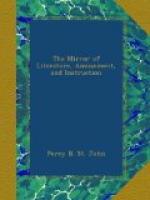Finding, nevertheless, that they all failed him, and heartily sick of the want of enterprise among his own countrymen, he resolved to try his fortune in Europe. He visited Cadiz, from thence took a passage to Brest, and from Brest to L’Orient, where he was successful in prevailing on some merchants to fit out a ship for his north-west adventure; but this project also failed, and Ledyard became once more the sport of accident.
He now proceeded to Paris, where he was received with great kindness by Mr. Jefferson, the American minister, who so highly approved of his favourite scheme of an expedition to the north-west coast, that, we are told by his biographer, the journey of Lewis and Clarke, twenty years afterwards, had its origin in the views which Jefferson received from Ledyard. Here, also, he met with the notorious Paul Jones, who was looking after the proceeds of the prizes which he had taken and carried into the ports of France. This adventurer entered warmly into his views, and undertook to fit out two vessels for the expedition. It was settled that Jones was to command the vessels, and carry the furs to the China market, while Ledyard was to remain behind and collect a fresh cargo ready for their return, after which he meant to perambulate the continent of America, and show his countrymen the path to unbounded wealth. Jones, it seems, was so much taken with the plausibility of a scheme, which presented at once the prospect of adventure, fame, and profit, that he advanced money to Ledyard to purchase a part of the cargo for the outfit; but, being suddenly called away to L’Orient, to look after his prize concerns, his zeal for this grand scheme began to cool, and, in a few months, the whole fabric fell to the ground.
Ledyard now felt himself a sort of wandering vagabond, without employment, motive, or means of support; the supplies he had received from Jones had ceased, and he was compelled to become a pensioner on the bounty of the American minister and a few friends. It would appear, however, from some lively letters written by him at Paris, that his flow of spirits did not forsake him.
“The two Fitzhughs,” he says, “dine with me to-day in my chamber, together with our worthy consul, Barclay, and that lump of universality, colonel Franks. But such a set of moneyless rascals have never appeared, since the epoch of the happy villain Falstaff. I have but five French crowns in the world; Franks has not a sol; and the Fitzhughs cannot get their tobacco money. Every day of my life,” he continues, “is a day of expectation, and, consequently, a day of disappointment; whether I shall have a morsel of bread to eat at the end of two months, is as much an uncertainty as it was fourteen months ago, and not more so.”
While in this state of penury he received a visit, the object of which was so creditable to a gentleman still living, and not unknown in the annals of science, that it gives us pleasure to print the story in Ledyard’s own words:—




